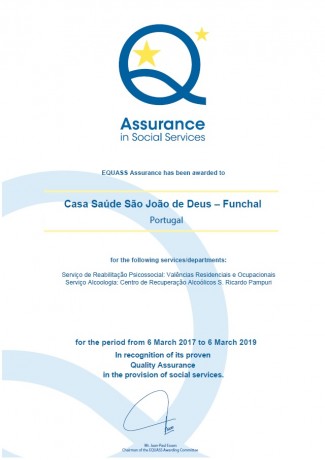The Rehabilitation Services have a multidisciplinary team and are organised along two lines:
Residential
The training of skills is individualised, based on the Individual Intervention Plan and includes: Training of basic, instrumental and advanced daily life activities, namely, hygiene, clothing, meals, medication management, money management, domestic management, shopping, use of community resources, socialisation, means of communication, occupation, leisure, time management; Maintenance of skills that have already been learned.
INTRA-INSTITUTIONAL RESIDENTIAL UNITS
The inter and transdisciplinary intervention in psychosocial rehabilitation aims to achieve the greatest possible degree of autonomy by the patient, improve their quality of life and enhances the exercise of citizenship, through interventions adjusted to the needs and characteristics of each patient.
Thus, it has the following facilities:
- Brother Cândido Rehabilitation Unit (20 patients)
- Modular Rehabilitation Units I, II and III (8 patients each)
- Blessed Olallo Rehabilitation Unit (22 patients)
- Autonomy Training Residence - Vivenda Romã (7 patients) - integrated in the RNCCI pilot projects, it aims at providing maximum individual autonomy, preparing patients to deal effectively with daily demands, making them able to (re)integrate in the community.
During their stay in the rehabilitation units, patients have an active role in their rehabilitation process, based on recovery, sharing responsibilities with the technical team and family, to ensure the smooth running of the project, enhancing their empowerment, self-determination, quality of life and social inclusion.
COMMUNITY RESIDENTIAL UNITS
The living units, with maintenance and/or training of autonomy in the community, integrate patients with no residential alternative but with community reinsertion competences. They do not have a fixed length of stay and include the following services:
Protected Life Units (Joint Ordinance 407/98)
- Girassol Residence (6 patients)
- Golfinho Residence (5 patients)
Independent Living Unit (Joint Ordinance 407/98)
- Orchid Residence (6 patients)
Autonomous Unit still without protocol
- Vontade Residence (4 patients)
Autonomous Unit
- Esperança Mental Health Autonomous Residence (6 patients)
A unit integrated in the pilot project of the National Integrated Continued Care Network, aimed at people with a reduced degree of psychosocial disability due to serious mental illness, clinically stabilised, without adequate family or social support. The therapeutic programme of the residence is based on the Individual Intervention Plan and includes: psychosocial support, support in planning daily life activities and integration in professional or socio-occupational activities, access to general and specialised medical care, medication management support, access to social and leisure activities.
OCCUPATIONAL SERVICES
The Occupational Workshops provide patients with a space to carry out different activities that contribute in a rewarding way to the maintenance and/or development of their abilities. It can accommodate 40 patients and is open on working days from 9 a.m. to 4.30 p.m.
The Productive Activity Workshops aim to offer patients a structured occupational space that allows them to acquire/maintain work habits and pre-labour practice, in order to improve their overall quality of life. It can accommodate 45 patients and is open on weekdays from 9 a.m. to 4.30 p.m.
The Hospitality Day Area is an occupational service, which aims to provide a structured environment, focused on the expectations, interests and needs of psychiatric patients, in order to enhance maximum autonomy and improve their quality of life. Thus, it aims to provide therapeutic and occupational support to non-institutionalised patients (preventing the so-called "revolving door" syndrome) and to patients integrated in rehabilitation units or in other units of the Telhal Health Centre.
It can cater for 35 patients and is open on weekdays from 9 a.m. to 4.30 p.m.
Vocational Training aims to promote the empowerment of people with mental illness and disability, through the acquisition of employability skills and greater community integration, contributing to an increase in empowerment. It contemplates interventions that encourage the recovery and learning of personal, relational and social skills, mobilising different community actions and creating new social relations, towards active citizenship.
As part of this process, there are two Vocational Training courses aimed at the acquisition of knowledge, skills, attitudes and forms of behaviour required to perform the functions of a profession. The training component of the courses is theoretical and practical.
- Computer Course
- Gardening Course
It can accommodate 20 patients (8 for each training course), and the maximum duration of each course is 22 months.
Intervention centre for sports and leisure: Desportivamente.
Intervention centre for Art and recreational-cultural purposes: Experimentarte and atelie's de arte.





















